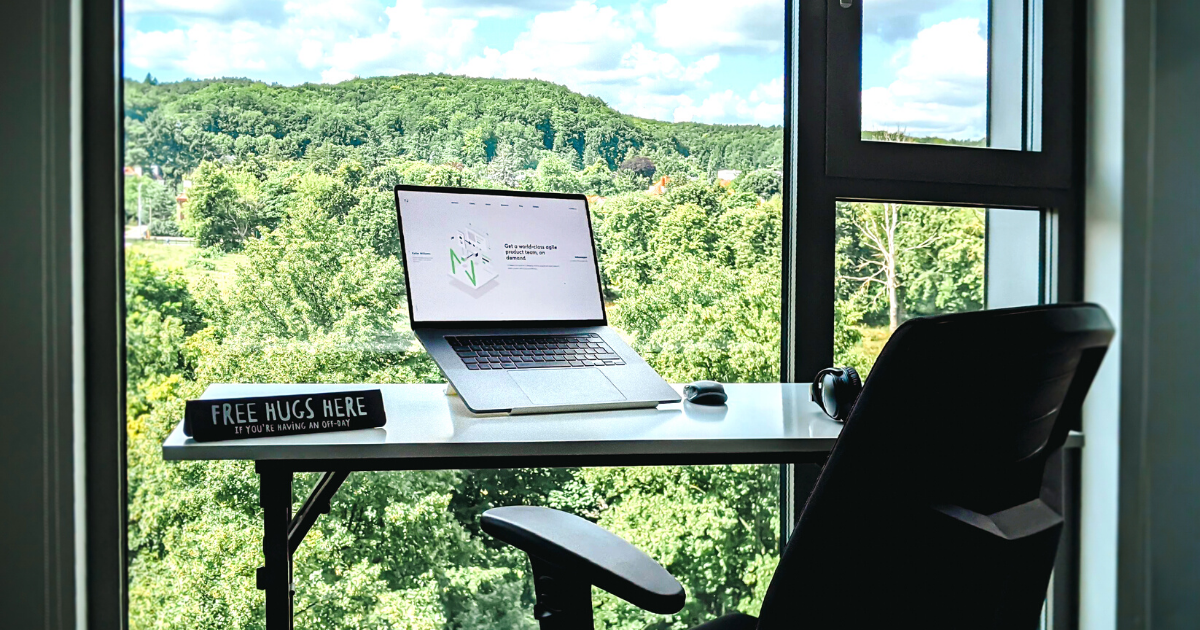It Takes a Team to Win - Why Strengthening the Business Ecosystem Is More Important Now Than Ever

We break them down to shift the discussion from abstract concepts to tangible actions that influence our everyday work. This article gives our take on the business ecosystem.
Knowing the playing field
“We knew that the model of transactional and hierarchical relationships between organizations is outdated. Replacing it with a model of the business ecosystem gave us the confidence to explore and find opportunities to grow the entire system,” recalls Marek Talarczyk, Netguru’s CEO.

The insight of making the whole network stronger rather than strengthening Netguru’s individual connections was transformative. It helped the company meet the expectations of various groups, provide more value, and make an impact on its business ecosystem that wouldn’t be possible otherwise.
According to Marek, identifying the company’s stakeholders and their relationships with each other played a crucial role in enabling Netguru’s growth. “We did this exercise a couple of years ago to understand who we serve and what kind of value we can exchange with different entities,” says Marek. “The picture that emerged was a network - larger and more interconnected than we anticipated”. For the first time ever, Netguru saw its entire playing field and the possibilities that come with it.
Understanding the rules of the game
Business strategist James Moore adapted the biological concept of an ecosystem in his 1993 Harvard Business Review article “Predators and Prey: A New Ecology of Competition”, in which he paralleled companies operating in the increasingly interconnected world of commerce to a community of organisms adapting and evolving to survive. A business ecosystem is a network of interlinked entities — including employees, suppliers, customers, communities, and government agencies, among others — involved in the delivery of a product or service. Each entity in the ecosystem affects and is affected by the others, creating a constantly evolving relationship and jointly adapting to external disruptions.
“Once a company understands its role and influence on its business ecosystem, it can act more intentionally to maximize value within this system,” explains Marek. “It may involve facilitating value exchange between different organizations without directly benefiting from it, or building stronger relationships to discover new kinds of value that can be created”. As a result, a company can grow in a truly sustainable way - taking into account its complete impact on its environment. Often, this growth results from leveraging opportunities that are not that obvious to someone who thinks in a typical, transactional way. “We always try to dig deeper, go beyond simple exchanges of remuneration for services or compensation for work, to find out how we can change to enrich the relationship with our partners,” explains Marek.
Netguru’s play tested in practice
While growth is most visible in times of prosperity, another effect of playing an active role in a business ecosystem becomes invaluable in times of crisis - resilience. The outbreak of the COVID-19 pandemic was a disruption that touched every company and tested its ability to respond and adapt.
“As a CEO, I am responsible for the Netguru team feeling safe in various areas: health, finance, and psyche. We needed to address all of them,” says Marek. When it comes to health, Netguru's reaction was quick and straightforward - as one of the first companies in Poland we closed all of the offices and within 24 hours shifted to fully remote work. The quick reaction helped to reduce stress related to health hazards and improved the team's morale. To alleviate stress regarding financial conditions, Marek intensified internal communication: “I switched from a monthly to a weekly cadence of writing a letter to all Netgurals to provide transparent information about the company's business situation”. In the psychological aspect, one of the previously identified stakeholders came forward - families of Netguru employees. “We acknowledged the difficulty of providing care for loved ones during the country-wide lockdown and enabled a lot of flexibility in working hours to put families first,” recalls Marek.
Netguru also went the extra mile to be closer to its customers than ever before. The company representatives could reach out to them and provide help in facing pandemic-related challenges. “Companies that hadn’t built an ecosystem before and had no clear understanding of its value were at risk of falling out of the market. We talked to our customers frequently to come up with and execute plans that address specific challenges or take advantage of new opportunities and actually make their businesses indispensable” says Marek. Timely and transparent communication builds trust and creates support for the whole ecosystem to face and survive the threat together.
Another important part of Netguru’s business ecosystem is the community of networked companies and IT professionals. To help other organizations in the rapid switch to remote work, Netguru has launched initiatives of open knowledge sharing, drawing from its over 10 years of experience as a remote-first company. To engage IT professionals, whose job stability has been disrupted in these uncertain times, Netguru extended the offer of Netguru Marketplace. This platform of freelance opportunities was created in 2018 and saw significant growth during the COVID-19 pandemic, allowing more people to join the company’s projects and support its clients with needed talent.
Marek summarizes: “This was a moment of truth for Netguru’s approach to building an ecosystem. Because we had understood our role before, we knew what value we could provide and we simply doubled down on it”. Organizing resources around these key areas helped the company adapt to changing conditions and leverage its business ecosystem to increase its resilience.
How to build a dream team
An important aspect of operating in a business ecosystem is the ability to form a partnership with all stakeholders. There is no room for relationships based on hierarchy, it is trust and transparency that help form lasting partnerships. “It’s not easy. Very few organizations are ready to start such a deep relationship from day one,” explains Marek. “They typically start small and need to prove themselves before trust is established and both sides are ready to move to the next level”. It all starts with the excellent quality of provided services or other value exchange that sparks trust between parties. Next, it requires openness from both sides to explore other areas of shared benefit. This, in turn, leads to increased transparency and closer cooperation that forms a partnership. In practice, however, it might not be as easy as it sounds.
“It requires a specific mindset to make the partnership work. Typically a company needs to take a risk and invest more than seems reasonable, overdeliver, provide added value it was not directly asked for,” says Marek. “It might mean sacrificing short-term gains, as the return on investment is not certain and often delayed, and hoping to have a long-term win”.

Many companies look for transactional quick gains and lose the opportunity to win big. Marek adds: “It takes persistence, patience, and consistent value building to transform a business relationship into a proven partnership.”

Netguru’s value flywheel
As the relationship between organizations becomes richer, stronger, and founded on mutual trust, more value exchange opportunities are exposed. If they are successfully pursued, it further strengthens the partnership and increases the amount of value that the organizations benefit from. This creates a self-fueling cycle - the value flywheel - that once put in motion keeps the value flow going and growing.
Marek concludes: “There is no other way for Netguru. This approach has been driving our transformation from an outsourcing business into a software consultancy business. We believe that actively building our business ecosystem and strengthening our partnership will allow us to meet our aspirations: Become a global leader in digital transformation, positively impact 1 billion people, and keep the spirit of the company and foundations of our culture along the way”.







